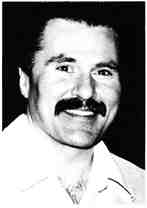 Charles Abourezk
IITC Legal Counsel | Charles is an attorney, newspaper columnist and contributing editor for Native Nations Magazine. He is known for his precise and humorous critiques of institutional racism. He is also a Human Rights Specialist who represented the International Indian Treaty Council at the United Nations Commission on Human Rights for five years. He is a founder of KILl Radio on the Pine Ridge Indian Reservation - a station that provides critical communication for various remote communities. He is former director and producer of nationally syndicated "First Person Radio" and former Minority Affairs Producer for South Dakota Public Television. He is an expert on treaties, federal Indian law and tribal law and is currently an adjunct professor for Oglala Lakota College in the "Manager as Warrior" Graduate Studies Program. - Anti-Indian Racism
- Development on Indian Reservations
- Indigenous Human Rights
- Federal Indian Law & Tribal Law
|
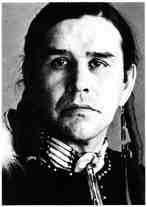 Clyde Bellecourt
Anishinabe - Ojibwe Nation
{Minnesota} | Clyde is a founder and Director of the American Indian Movement. He was a major figure in the occupation of Wounded Knee in 1973 and played a founding role in an ongoing Indian School System, Legal Rights Center and the International Indian Treaty Council. He is also directing the Peacemaker Center for Indian youth and the AIM Patrol which provides security for the Minneapolis Indian community. He is an organizer of the National Coalition on Racism in Sports and the Media. He is founder and currently Chairman of the Board of American Indian OIC, an innovative job program that has moved over 14,000 people from welfare to full-time employment. Clyde sees a bright future: "This generation of little children is the 7th Generation. Not just Indian children but white, black, yellow and red. Our grandfathers said the 7th generation would provide new spiritual leaders, medicine people, doctors, teachers and our great chiefs. There is a spiritual rebirth going on." - The American Indian Movement: Past, Present & Future
- Racism in Sports & The Media
- Alternative, Culturally-Based Indian Education
- American Indian Opportunities, Industrialization Centers
|
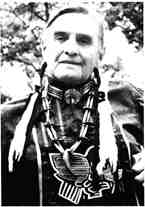 Vernon Bellecourt
(WaBun-Inini)
Anishinabe - Ojibwe Nation
{Minnesota} | Vernon is a principal spokesman for the American Indian Movementand a leader in actions ranging from the 1972 occupation of the Bureau of IndianAffairs in Washington to the 1992 Redskin Superbowl demonstrations. He isCo-founder and first Executive Director of the Denver AIM Chapter. Hisinvolvement at Wounded Knee in 1973 led to a Federal indictment. He is a specialrepresentative of the International Indian Treaty Council and helped organize thefirst Treaty Conference in 1974. He was jailed for throwing his blood on theGuatemalan Embassy to protest the killing of 100,000 Indians. He was elected to a4-year term in his White Earth tribal government and developed a model programfor the spiritual education of Indian prisoners. Vernon is President of theNational Coalition on Racism in Sports & Media and recipient of the City ofPhoenix, Martin Luther King Human Rights Award 1993. - Spiritual, Cultural, Philosophical, Ideological, Social, Economic, & Political Realities
- The American Indian Movement: 1492 to the Present
- The International Indian Treaty Council: 1974 to the Present
- Indian Tribal Law, and International Treaty Law
- Constitutional Rights, FBI/CIA Surveillance & Covert Action
Mascots & Stereotypes |
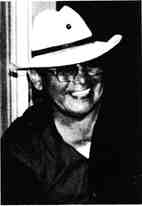 Edward Benton Banai
Lac Court Orielles Band, Ojibway Nation
{Wisconsin } | Eddie is a Spiritual Teacher of the Lac Court Orielles Band of the Ojibway Nation. He was the founder of Red School House, an Indian-controlled school with 150, K through 12 Indian students. He is a pioneer in culture-based curriculum and Indian alternative education who believes that education should be built on identity, spirituality, music, heritage and pride. As author of The Mishomis Book (Indian Country Press), Eddie has set down the oral history of the Ojibway nation and presented his life within the family circle. He learned from the tribal elders who possessed the memories and wisdom of the Ojibway and carefully preserved the ancient traditions. The book is an account of the culture, history and philosophy of the Ojibway. Eddie believes, "It is time to talk with our Brothers and Sisters of other nations, colors and beliefs. The ideas and philosophies of yesterday may be the key to the world family's future." Eddie has a Master's Degree in Education and is Co-founder of the American Indian Movement. - Indian Alternative Education & Culture -Based Curriculum
- The Ancient Teachings & Traditions of the Ojibway: a Guide to Modern Living
|
 Nathan Keliikui Brown
Kingdom of Hawaii | Nathan coordinates Research & International Law for the Ohana (family) Council - a leading organization in the dynamic Native Hawaiian movement to re-assert independence & self-determination. In 1878 Captain Cook came upon, "400,000 island residents with a well-developed, flourishing culture and lifestyle. They were robust & healthy and had a coherent system of spiritual beliefs, economics and scholarship." In 1893 armed white settlers and the U.S.Marines overthrew the Sovereign Hawaiian Kingdom in violation of a Treaty of Peace & Friendship. For Nathan's people, self-determination is the right to choose ones destiny in compliance with The U.N. Charter, Article 73. Nathan is of Kanaka Mooli (Hawaiian) descent from a family of 14 children raised in a rural lifestyle in the heart of Downtown Honolulu. After several arrests, he is under federal indictment for exercising his human rights. He is currently assisting Kanaka Maoli communities with the Ohana Council Self-government Charter that lays a foundation for self-determination & self-governance. Nathan engages in eloquent unveiling of truth through the spirit of Aloha. - Successes of the Native Hawaiian Sovereignty Movement
- Indigenous Self-Determination as Guaranteed by the U.N. Charter
- Cultural Survival Based on Rights to Develop Self-Sufficient & Self-Reliant Economies
|
 Andrea Carmen
Yaqul Nation
{California} | Andrea is currently Executive Director of the International Indian Treaty Council. Much of her work involves expanding the support network for Indians throughout the hemisphere. She speaks fluent Spanish and has extensive experience working with Indigenous Peoples in North and Central America. She recently worked with Nobel Peace Prize Laureate, Rigoberta Menchu, at the First World Summit of Indigenous Peoples held in Guatemala during the coup d'etat. She also was an advisor to the World Council of Churches on their relationship with traditional Indian peoples. She lives in Chickaloon, Alaska and is past coordinator of the Native Alaskan Elders Sovereignty Network as well as current co-coordinator of the Chickaloon Village Environmental Protection Program. She consults with several Indian communities and organizations on economic and community development. She graduated from the U of California in Women's Studies and was selected "Speaker of the Year" by People Are Speaking in San Francisco. - Human Rights Work of the Treaty Council at the United Nations
- Current U.N. Developments Affecting Indigenous People
- Indian Women & Children'S Rights & Political Participation
- Traditional Perspectives & Concerns about the Environment
- The Effects of Development & Toxic/Nuclear Contamination
- Community-Based Organizing & Assertion of Sovereignty
|
 Robert Cruz
Tohono Q'odham Nation
{Papago, Arizona} | Robert was raised by his grandparents in a typical traditional home in the beautiful Sonoran desert. His family ranched and farmed in a climate that required a relentless quest for water. After ages of harmonious living his people were invaded by the U.S. and Mexico. The enforced border created profoundly complex legalities resulting in extreme violations of land and human rights. As the Southwest Coordinator of American Indians Against Desecration, he assisted in the passage of the Native American Graves Protection and Repatriation Act. He helped in recovering the remains of 6,000 Indian ancestors from institutions and private collections for reburial. He works with the World Archeological Congress of professionals dedicated to ethical archeology. As board member of the Treaty Council, he works extensively at the U.N. and recently provided security for Rigoberta Menchu in Guatemala during the coup d'etat. He is 1993 recipient of the Bill Wahpepah Memorial Human Rights Award. - Native Rights, Human Rights & Environmental Protection
- The Native American Grave Protection & Repatriation Act (NAGPRA)
- Cultural Preservation & Community Organization
- Police Abuse & Prisoner Rights
|
 Lenny Foster
Diné Nation
{Navajo, Arizona} | Lenny is the Director of the Navajo Nation Corrections Project and the Spiritual Advisor for 1,500 Indian inmates in 34 state and federal prisons in the Western U.S. He has co-authored legislation in New Mexico, Arizona and Colorado that allows Native American spiritual and religious practice in prison and results in significant reductions in prison returns. He is a board member of the International Indian Treaty Council, a sun dancer and member of the Native American Church. He has been with the American Indian Movement since 1969 and has participated in actions including Alcatraz, Black Mesa, the Trail of Broken Treaties, Wounded Knee '73, the Menominee Monastery Occupation, Shiprock Fairchild Occupation, the Longest Walk and the Big Mountain land struggle. He was a 1993 recipient of the City of Phoenix, Dr. Martin Luther King Human Rights Award. - Religious Freedom for Indians in Prison
- Using the Spiritual Path to Avoid Being Institutionalized
- Sovereignty Self-Determination & Human Rights
|
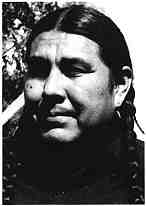 Tom Goldtooth
Diné Nation | Tom is a spokesperson for the Indigenous Environmental Network (lEN). lEN is a national, grassroots, environmental organization involved with stopping toxic and nuclear dumping on or near Indigenous lands and with leading the struggle to reform national environmental, economic and energy policies that are genocidal to Indigenous people. Tom is the Coordinator of the Red Lake Nation (Minnesota) Environmental Protection Department that is developing an Indigenous environmental infrastructure based on traditional eco-knowledge. He is involved with local, state, national and international issues directly related to the environmental justice movement. He advises various science and historical museums on the repatriation, deassessment and reburial of human remains and return of cultural items. He is dedicated to the empowerment of grassroots communities, maintaining Indigenous traditional values, and the protection of Indigenous rights and self-determination. He believes that to work for the struggle of protecting the earth, one has to respect the sacredness of the creative principle of women that is rooted in Mother Earth. - Traditional Eco-Knowledge & Sustainable Community
- Environmental Protection On and Near Indigenous Lands
- Cultural and Spiritual Preservation
- Indigenous Deep Ecology: Rethinking Our Relationship to the Land and Each Other
- Environmental Racism & the Environmental Justice Movement
|
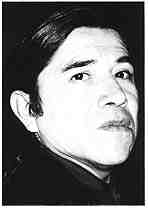 Antonio Gonzales
Seri/Chicano
{California} | Tony is U.N. Liaison Officer and coordinates Treaty Council participation at the U.N. Commission on Human Rights in Geneva. He works with the U.N. Working Group on Indigenous Populations to complete the Universal Declaration on the Rights & Principles of Indigenous Peoples - a document that will establish a standard for countries to co-exist with Indigenous Peoples. In 12 years at the Treaty Council he has Coordinated Community Outreach and Research & Documentation and been Director of Operations. He has met Gorbachev, Arafat, Nelson Mandela} and other world leaders to discuss Indigenous Sovereignty, environmental degradation, religious freedom, torture and political persecution. A current focus is a U.N. study on nation/state violations of Treaties. At the 1993 U.N. World Conference on Human Rights, he helped successfully lobby countries to call for an International Decade of Indigenous Peoples. He helps build unity between Indigenous people of all colors by emphasizing their shared history and common vision for the future. As a Vietnam combat veteran, Tony lived the horror of war and was inspired to work for human rights. - Current U.N. Developments Affecting Indigenous People
- Evaluation of the U.N. Working Group on Indigenous Populations
- Sovereignty Human Rights & Environmental Protection
|
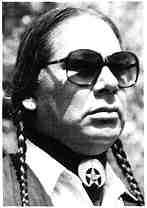 Michael Haney
Seminole/Sioux
{Oklahoma} | Mike regards himself as lobbyist for his people and says "as long as white America treats Indians as not quite human mascots or cartoon figures, they will never deal with Indian education and economic development." He is a leader of demonstrations against the Florida State Seminoles, Kansas City Chiefs, the Braves and the Redskins. He is part of a spiritual & holistic approach toward removing conditions that bar Indians from reaching their potential. He confronts the Smithsonian Institute where Indian materials are in the dinosaur section and takes on archaeologists & museums who disturb Indian burials or display artifacts. He also targets hazardous waste sites on tribal land. Mike grew up on "the rez" in Seminole County, Oklahoma. He was swept up in the early days of Indian activism at Alcatraz and has been bayoneted and beaten by federal agents. He was at Wounded Knee in 1973. He is a leader of the National Coalition Against Racism in Sports & Media. The campaign has had an effect as Dartmouth, Stanford and dozens of others have dropped Indian names. - Mascot Issues: the National Coalition Against Racism In Sports & Media
- Human Rights, Self-Determination & Environmental Protection
- Protection & Repatriation of Indian Graves
|
 David Harrison
Athabascan
{Alaska} | David Harrison is a 34-year-old Athabascan Indian from Chickaloon Village, Alaska. He is Coordinator of the Chickaloon Legal Department, Director of Alaska Rights Consultants Tribal Organization and past coordinator of the Native Alaskan Elders Sovereignty Network. He is also a National Councilman for the Indigenous Environmental Network, an organization dedicated to the protection of Mother Earth and the tradition of ecologically sustainable development. He is an advocate on issues of sovereignty, traditional government, fishing and hunting rights, and the genocidal effects of the Alaska Native Claims Settlement Act. He will be speaking on these issues and current efforts by Indigenous Alaskans to reassert the traditional sovereign rights of Alaska Native Peoples. - Indigenous Sovereignty & Traditional Government
- Indigenous Hunting & Fishing Rights
- Genocidal Effects of the Alaska Native Claims Settlement Act
- Environmental Action & the Indigenous Environmental Network
|
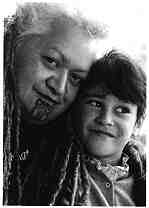 Hinéwirangi
& daughter Anewa
Maori Nation, Aotearoa
{New Zealand} | Hiné is Coordinator of the Maori Women's Resource Center and a Representative of the Nuclear Free and Independent Pacific movement. She is a Board Member of the International Indian Treaty Council and has served as Co-Director. She is mother of two children and has mothered several others. She has published four volumes of poetry, is currently working on a novel and has written and directed 6 videos for children about recognizing sexual abuse. She has written many dramas reflecting her culture. Her life's work has been with women and children, healing effects of abuse. She conducts workshops on all aspects of the Maori philosophy: the Hinengaro - Mental well being; the Wa}irua} - Spiritual well-being; the Wha}na}u - Family well-being; and the Tinana - Physical well-being. Hiné also does workshops on: traditional Maori healing; indigenous poetry writing; creating indigenous drama; Maori parenting; traditional women in this new world; Maori flute making; healing women's pain; and traditional views of sex & sexuality. - Sovereignty & the Effects of Colonization on Indigenous Peoples
- The Healing of Our People That Lies Within Our Own Cultures
- Learning the Interconnectedness Throughout the Indigenous Women's World
|
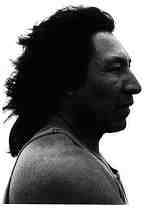 Puksu lgualikinya
Kuna Nation
{Panama} | Puksu challenges the environmental movement to not only defend forests, water and animals, but indigenous people as well. "Whenever natural resources are discovered on Indian land, governments try to push the Indians out. Indian people want to reclaim their territories, practice their religions & educate in their own way." The Kunas maintain their autonomy and protect their pristine environment on the tropical islands and rainforests of Panama. They have their own national congress and armed forces to protect their sovereignty and traditional way of life. Puksu is on the Board of the International Indian Treaty Council and is the Kuna representative at the U.N. Human Rights Commission. In 1972 he co-organized the Kuna Youth Movement and remains international representative. He co-organized the World Congress of Indigenous Peoples and Co-founded the Indigenous Organization of Central America & Mexico. He was keynote speaker at major European conferences on Indigenous Peoples & Tropical Rainforests and also at two Rainfo rest Action Network conferences. He was featured speaker at the Madrid Conference on Indigenous Resistance to the 500 Year Invasion. - Protecting Indigenous People as Well as the Environment
- Sovereignty Self-Determination & Human Rights
- Kunaagri culture & Ecology
- The Kuna Experience Wwith Autonomy in Panama
|
 Sarah James
Gwich'in Athabascan Nation
{AIaska} | Sarah is Chair of the Gwich'in Steering Committee made up of representatives from villages of the ancient caribou culture. Sarah represents her people under the direction of the village elders and is dedicated to protecting the caribou herd and the basic tribal and human right to continue the Gwich'in way of life in the same place as it has been for thousands of years. She is a Member of the Arctic Village Traditional Council and lives 150 miles from the nearest highway. The Gwich'in and supporters have stopped the proposed oil drilling in the Arctic National Wildlife Refuge for now. However, Sarah continues to be gravely concerned about the effect global warming may be having on the Caribou herd. The unprecedented warm weather is altering plant and animal life. She is a Board Member of the International Indian Treaty Council and travels the world recruiting help for the Gwich'in and supporting other Indigenous efforts to protect land and culture. Her people feel it is their responsibility to keep the land pure and pass it onto all Indian and non-Indian generations to come. - Oil Drilling & Global Warming: Continued Threats to the Arctic National Wildlife Refuge
- Protecting Traditional Life with the Caribou
- Indigenous Peoples: Part of the Ecology That Must Be Protected
|
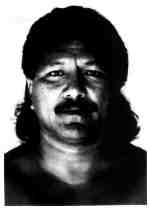 Dennis "Bumpy" Kanahele
Hawaiian Kingdom | Bumpy is a coordinator and spokesperson for the Ohana (family) Council - a vital organization in the Native Hawaiian movement to re-establish sovereignty. 1993 marked 100-years since the U.S. invasion & annexation of the Hawaiian Kingdom in violation of a Treaty of Peace & Friendship. The Hawaiians have never relinquished their valid titles and rights in spite of a military occupation that has accommodated desecration and exploitation of their lands, inland waters and ocean fisheries. In the 80's Bumpy took part in land claim occupations that ended in armed stand-off and resulted in a one-year prison term. Tactics consistent with the spirit of Aloha were used in 92 when he and 31 others were arrested at lolani Palace in a civil resistance that stirred up the State Government of Hawaii. Soon after, the Ohana Council of the Hawaiian Kingdom formed with A Charter for Self-Governance, under the U.N. Charter, Article 73. In 93 Bumpy was appointed to the Governor's Advisory Commission on Hawaiian Sovereignty. He is the newest Board Member of the International Indian Treaty Council, replacing the beloved Kawaipuna Prejean who passed into the spirit world in 1992. - Successes of the Native Hawaiian Sovereignty Movement
- Indigenous Self-Determination as Guaranteed by the U.N. Charter
- Cultural Survival Based on Rights to Develop Self-Sufficient & Self-Reliant Economies
|
 James Main, Sr.
Gros Ventre Nation
{Montana} | Jim is a highly respected elder on the Board of the International Indian Treaty Council and an Elder Representative of the Indigenous Environmental Network - an alliance whose mission is to protect Mother Earth from contamination and exploitation by maintaining and respecting traditional teachings and natural law. He is urgently seeking support to stop a gold mining operation that is destroying the sacred mountains and the headwaters of his traditional homeland on the Fort Belknap Reservation in Northern Montana. He works with his daughter who is Water Quality Coordinator for the reservation and his son who is Tribal Chairman. Jim works on treaty issues, water rights, sovereignty, religious freedom and prisoner rights. He is presently serving as Chairman of the Constitutional Review Commiftee at Fort Belknap. He also works with Indians at Montana State Prison as an advisor to a spiritual group called the Prayer Warriors who hold a Sweat Lodge Ceremony every Saturday. He has been working with the American Indian Movement for many years. - Water Rights, Sovereignty & Treaty Issues
- The Devastation of Gold Mining on Fort Belknap, Montana
|
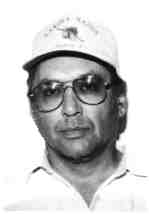 Ted Means
Oglala Lakota
{Sioux, South Dakota} | Ted is Executive Director of the Porcupine Clinic just over the hill from Wounded Knee. The clinic is the only independent health care facility in Indian Country and serves the Pine Ridge Reservation in the poorest county in the US. Before the clinic, health care was so remote that many people went without. The clinic dramatically improves access to dental and medical care and is a living example of what people can do to escape unhealthy dependence. Previously, Ted was Director of the Heart of the Earth Corrections Program serving Indian men and women in nine Minnesota & South Dakota prisons by providing cultural knowledge and skills needed to stay out of prison. He was a major player at Wounded knee and many actions of AIM since 1970. He organized for the Black Hills Alliance which pulled ranchers, urban whites and Indians together to stop Union Carbide from Uranium Mining in the sacred Black Hills. Ted represented the International Indian Treaty Council at a gathering ofAmazon Indians who met to form unprecedented alliances to save themselves from the deadly invasion of developers ravaging Rainforest life. - Health Care in Indian Country
- Native Rights, Human Rights & Environmental Protection
- Indian Water Rights
- The Rise of the A.I.M.: Wounded Knee '73 & Other Campaigns
- Political Rights of Indian Prisoners
|
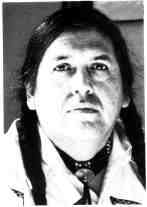 William Means
Oglala Lakota
{Sioux, South Dakota} | Bill is a founder of the International Indian Treaty Council and currently President of the Board. During his 9 years as Executive Director, he was responsible for the establishment of a system for documenting human rights violations against Indians. He is Co-founder of the U.N. Working Group on Indigenous Populations and an expert on U.S. & Indian Treaty relations. He was Executive Director of American Indian O.I .C., a job center that has placed over 14,000 people in full-time employment. He has been on the Grand Governing Council of the American Indian Movement since 1972. He is a veteran of Wounded Knee 1973 and helped coordinate legal defense work on over 500 Wounded Knee federal indictments. Bill has extensive negotiating experience with tribal, city, state, federal and international agencies. For 5 years he was Executive Director of the Heart of The Earth Survival School for Indians. He is on the Board of the World Archeological Congress and has lectured extensively at major universities here and abroad. He graduated from Black Hills State U, has been in many environmental campaigns including the Black Hills Alliance and is a Vietnam combat veteran. - Human Rights, Self-Determination & Indigenous Peoples
- Treaty Rights, Sovereignty & Environmental Protection
- Culturally Based Curriculum & Indian Education
- Job Training & Placement and Indian Gaming
|
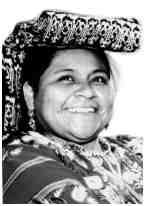 Rigoberta Menchu
Maya Quiché
{Guatemala} | Rigoberta won the 1992 Nobel Peace Prize. She is a leader in the Guatemalan people's effort to establish human rights and economic democracy in spite of a ruling class & Army that has killed more than 50,000 Indians since 1979. During the 1993 coup she joined 60,000 Guatemalans in the streets who forced the dismissal of the President. I, Rigoberta Menchu, An Indian Woman in Guatemala, is her story. She was active in Christian base communities and the Committee for Campesino Unity, an agricultural workers' union. In 1980 her father and 38 others were murdered when the Spanish Embassy, where they had sought refuge, was burned to the ground by Guatemalan security forces. The Army kidnapped, tortured, and killed her mother and brother. In 1981 she fled. Since 1982 Rigoberta has been active in the U.N. Human Rights Commission, Working Group on Indigenous Peoples. She has been on the International Indian Treaty Council Board since 1986. She created the Vicente Menchu Foundation, in memory of her father, for the purpose of searching for peaceful solutions to armed conflicts and promoting human rights & grassroots development. - The Struggle for Economic & Social Democracy in Guatemala
- Peace & Human Rights: an International Decade for Indigenous People
|
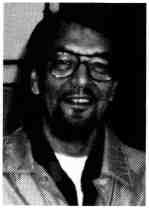 Charles Robertson, Sr.
Anishinabe/Dakota
{Red Lake Ojibway, Minnesota}
{Sisseton-Wahpeton Dakota, South Dakota} | Chuck is School Counselor for Heart of the Earth Survival School, a fully accredited K through 12 school for 150 Indian students. He is a key figure in the Indian community effort to restore self-esteem and mental health to the individual through family spiritual roots. He has extensive experience and provides seminar leadership in the following areas:- Culture-Based, Community Initiated, Child-Centered Learning Methodologies.
- Curriculum Materials Development for Native American Classrooms and Subject Disciplines.
- Classroom Planning & Management with Native Children.
- Behavior Management Programming in K-12 Students Reflecting a Stronger and Relevant Cultural Approach to Native Students.
- Comparisons between Contemporary (Public) Education Approaches and American Indian Culture-Based (Alternative) Education.
- Formation and Operations of Alternative Schools for Native American Communities ... Urban and Reservation.
- Community Based Service/Programming for Incarcerated Native Americans ... Counseling, Cultural, Re-Entry Support, Etc.
- Chemical Dependency Programming for Native Americans (Treatment Modalities, Continuum of Care, Prison Sobriety)
- Psychological Process Theory and Native American People.
|
 Yvonne Swan
Sinixt/Arrow Lakes Nation
{State of Washington} | Yvonne is a mother, grandmother, writer, artist and poet. She is presently Director of the International Indian Treaty Council Information Office in San Francisco as well as Coordinator of the Prisoner Rights Project. She serves on the Advisory Board for Leonard Peltier's Defense Committee and speaks on his behalf when called upon. Yvonne was the defendant in a murder case (State of Washington vs. Yvonne Wanrow 1972-1983) that set a legal standard for women's self-defense and defense of children known as the Wanrow Instruction. In 1973 she was convicted of second-degree murder by an all-white jury for killing a child molester who was threatening her children. She won an appeal based partly on the sexist jury instruction on the law of self-defense. She has done several speaking tours in Europe to support the Treaty Council delegation at the U. N. Commission on Human rights in Geneva. Canada is using her legal past to refuse her entry to ancestral territory in British Columbia where Sinixti Arrow lakes people have asked for her help in protecting burial grounds and sovereign rights. She is 1993 recipient of the AIM Ruben Snake Memorial Leadership Award. - Human Rights, Sovereignty & Self-Determination
- Sacred Sites, Women's Rights & Prisoners'S Rights
- Religious Freedom, Tradition, Culture & Spirituality
- Education, Environmental Protection & Legal Advocacy
|
 Charlene Teters
(Slum Tah)
Spokane Nation
{State of Washington} | Charlene is an artist and Professor at the Institute of American Indian Arts in Sante Fe, and senior editor of Indian Artist Magazine. She is on the board of the National Coalition on Racism In Sports & Media. She, Vernon Bellecourt, Mike Haney and other AIM people were assaulted by fans and U of Minnesota Police at a 1992 basketball game for peacefully demonstrating against the U of Illinois mascot - a dancing white student in an eagle-feathered headdress called Chief Illiniwak. She established the Office of Racial Justice for the National Congress of American Indians. Charlene is an accomplished artist featured in over 21 major exhibitions, commissions & collections. She is a Spokane, indigenous to the plateau region of what is now Washington state and works to support Indian children striving to transcend poverty and unemployment. Her politically powerful art attacks racist stereo-types that undermine Indian selfesteem. "Indians are human beings, not mascots. Warriors withiur society are about peace and life." - Mascot Issues & Racism
- Environment, Human Rights, Diversity & Racism
- Indian Art, Gender Roles in Art, Racism in Education
- Indian Grave Desecration & Repatriation
- Appropriation & Abuse of Indian Spirituality & Sacred Items
|
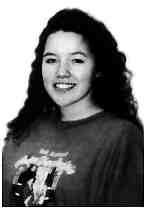 Chanté Westerman
Sinixt/Arrow Lakes/Dakota
{State of Washington} | Chanté was raised in a close knit community on the Colville Reservation in Washington state where she spoke her mother's native language. She is a writer and fancy dancer. As Youth Coordinator for the International Indian Treaty Council in San Francisco, she recruits volunteers and is helping develop an international youth network. In 1992 she went to Costa Rica for a U.N. Conference to help draft a World Youth Statement on Environment & Development that was presented to the Earth Summit in Brazil. She is part of the Treaty Council Forum on Human Rights Violations Against Indigenous Children. She participates in anti-drug and alcohol events and encourages young people to choose spirituality over alcohol and drugs. She feels fortunate that her family raised her in the ways of Indian spirituality. Spirituality is responsibility - respect the elders, raise the children well and live in harmony with nature. Chanté takes part in ceremonies honoring Mother Earth including pow wows and the sweat lodge. She is committed to protecting Indigenous culture and values through art, language and communication. - Human Rights Violations Against Indigenous Children
- The World Youth Statement on Environment & Development
- Choosing Spirituality Over Alcohol & Drugs
|
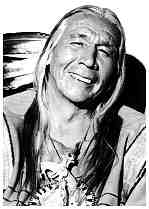 Floyd Red Crow Westerman
Dakota
{Sisseton Sioux, South Dakota} | Red Crow is Indian actor, singer, songwriter and advocate. He made his big screen debut in the movie "Renegades" and is best remembered for his role as elder/leader Ten Bear in "Dances With Wolves". His songs like "Custer Died For Your Sins" and "BIA Blues" have helped spread the American Indian Movement's message throughout the world. He has had featured roles in "Northern Exposure", "L.A. Law" and many other television series and movies. He performs with countless musicians including Willie Nelson, Bonnie Raitt and Don Henley in large benefit concerts for Indian self-determination, human rights and environmental protection. He toured the world with Sting to publicize the plight of the Rainforest People who are dying along with the Rainforests and, as caretakers, must be protected if the rainforests are to go on providing for all life on Earth. Red Crow has been an ambassador of good will representing the International Indian Treaty Council from the time of its inception. He is chairman of the Board for the National Coalition on Racism in Sports & Media. His concerts and lectures are characterized by sharp wit and humorous but solution-oriented critiques of Western Civilization. - Sovereignty Human Rights & the Environment
- The Plight of Rain Forest People
- The Evolving Hollywood Image of Indians
|
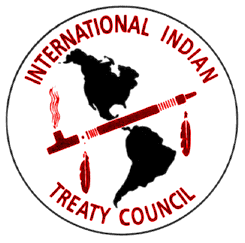 | The Year of the World's lndigenous Peoples is the outcome of a decade of United Nations work with indigenous peoples that focused primarily on violations of their human rights. Yet every aspect of the lives of the indigenous -- their detailed knowledge, their technical skills, their reverence towards nature and the environment -- is altering the way we view the worid and challenging deeply-rooted assumptions about "progress" and "development."
- United Nations |
aimggc@worldnet.att.net |


